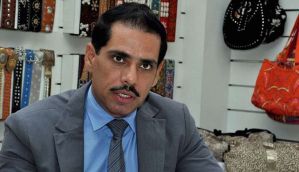Pathankot: Pak JIT 'not convinced' terrorists were from Pakistan
The Pakistani Joint Investigation Team that had visited India in March to gather evidence on the Pathankot attack has said it is "not convinced that its soil was used to plan the strike", according to a senior aide of Prime Minister Nawaz Sharif.
The aide said: "Anybody can call the Jaish-e-Mohammad numbers from India." India contends that the terrorists who attacked the air base in January were from the Jaish-e-Mohammad because phones recovered from the terrorists bodies' showed numbers linked to JeM leaders in Pakistan, according to the Hindustan Times.
Judith D'Souza may be held for ransom by crime cartel: Investigators
Indian aid worker Judith D'Souza who was kidnapped in Kabul on Thursday night might be held by a crime cartel that specialises in kidnapping foreign nationals for ransom, say sources among the investigators. Two men have been detained for questioning.
Kolkata resident D'Souza worked with the Aga Khan Foundation in Kabul.
A senior Indian diplomat in Kabul told The Indian Express, "The Aga Khan Foundation and the Indian mission are coordinating their efforts to secure her release. Frankly, the less publicity we have, the easier it is going to be."
CBI arrests rightwing Hindu group member for rationalist Dabholkar's murder
Three years after rationalist Narendra Dabholkar was murdered in Pune, the CBI arrested Dr Virendra Tawade, a member of the rightwing Sanatan Sanstha and Hindu Janjagriti Samiti for his killing.
Tawade was arrested from his Panvel residence at about 8.30 pm on Friday, and will be produced before a Pune court today, said a CBI official. "He is one of the conspirators in the Dabholkar murder," added the officer.
Eight days ago, the CBI had searched the residences of Tawade and Sarang Akolkar, another member of the Sanatan Sanstha, says the Hindustan Times.
HCU prof resigns over appointment of 'anti-Dalit' pro VC
Sreepati Ramudu, Hyderabad University's head of the Centre for the Study of Social Exclusion and Inclusive Policy, resigned on Thursday over the appointment of Vipin Srivastava as pro-vice chancellor. Students agitating at the university have accused Srivastava of abetting suicides by two Dalit scholars, including Rohith Vemula and the university's Dalit and Tribal Teachers' Forum had opposed Srivastava's promotion.
Srivastava was promoted on Tuesday. He had been the head of a sub-committee that upheld the punishment dealt out to five Dalit scholars including Rohith Vemula, who hanged himself on 17 January, according to The Telegraph.
NHRC asks UP govt why Hindus are migrating from Muslim-majority Kairana
The National Human Rights Commission has asked the Uttar Pradesh government to file a report within four weeks on the situation in Kairana from where BJP MP Hukum Singh said about 250 Hindu families had been forced to leave due to threats, extortion and increased crimes against their community.
The NHRC called the allegations "serious in nature" and directed its deputy inspector general (investigation) to send an inquiry team to the town and submit a report in two weeks, according to the Hindustan Times.
Kerala construction co settles case against Sonia Gandhi out of court
A civil case filed by a construction company in Kerala against Congress president Sonia Gandhi and other party leaders over alleged non-payment of dues in the construction of the Rajiv Gandhi Institute of Development Studies has been settled out of court.
"The civil case has been settled out of court and the settlement arrived by both the parties has been informed to the court," said RGIDS director and former KPCC General Secretary Hidur Muhammed in a statement issued on Friday, according to The Indian Express.
Ancient DNA tells of two origins for dogs
Genetic analyses of a 4,800-year-old Irish dog and 59 other ancient dogs suggest that canines and humans became pals in both Europe and East Asia long before the advent of farming, says a report in sciencenews.org.
Later, dogs from East Asia accompanied their human companions to Europe, where their genetic legacy trumped that of dogs already living there.
Therefore, dogs were domesticated at least twice. That muddled genetic legacy may help explain why previous studies have indicated that dogs were domesticated from wolves only once, although evidence hasn't been clear about whether this took place in East Asia, Central Asia or Europe.
The idea that dogs came from East Asia or Central Asia is mostly based on analysis of DNA from modern dogs, while claims for European origins have been staked on studies of prehistoric pups' genetics.
A 4,800-year-old dog found in a tomb in Newgrange, Ireland, is the first ancient dog to have its entire genetic instruction book, or genome, deciphered. Researchers don't know much about what the midsize dog looked like; it doesn't bear any genetic markers of particular modern dog breeds, Frantz says. "He wasn't black. He wasn't spotted. He wasn't white." Instead, the Newgrange dog was probably a mongrel with fur similar to a wolf's.
Westerners lack education on nuclear disaster risks
Western societies would not respond well to a Fukushima-style nuclear disaster due to a lack of public information, a leading disaster expert has warned. Christopher Abbott told the Guardian he firmly believed that the public ought to be better educated over the hazards and risks they may face. Illustrating his point, he referred to the Fukushima disaster of 2011 in which 160,000 people were evacuated from the vicinity of the plant as experts attempted to tackle the emergency. The evacuation worked, said Abbott, because "the Japanese educate the public". "I just don't see that it would have worked as successfully in western society," he added. "[It's] a very personal opinion but one that is backed up by Japanese colleagues." Abbott, chairman of the Emergency Planning Society CBRN professional working group, made the remarks while giving evidence to a science and technology select committee hearing at the House of Commons on chemical, biological, radiological or nuclear incidents. "We need to better educate the public, because a well-educated public will respond better," he said.







![BJP's Kapil Mishra recreates Shankar Mahadevan’s ‘Breathless’ song to highlight Delhi pollution [WATCH] BJP's Kapil Mishra recreates Shankar Mahadevan’s ‘Breathless’ song to highlight Delhi pollution [WATCH]](https://images.catchnews.com/upload/2022/11/03/kapil-mishra_240884_300x172.png)

![Anupam Kher shares pictures of his toned body on 67th birthday [MUST SEE] Anupam Kher shares pictures of his toned body on 67th birthday [MUST SEE]](https://images.catchnews.com/upload/2022/03/07/Anupam_kher_231145_300x172.jpg)






